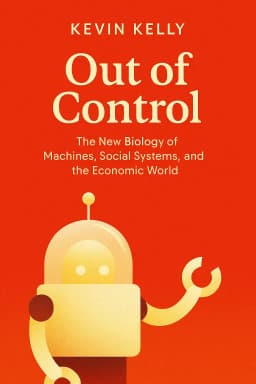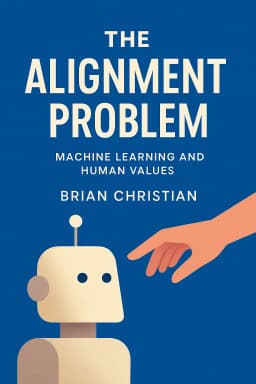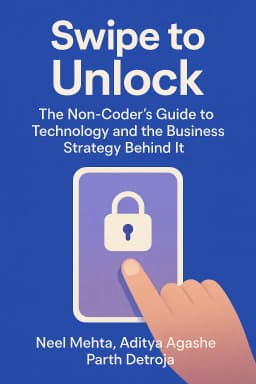
Beyond the Algorithm: Engineering Systems That Live
Golden Hook & Introduction
SECTION
Albert Einstein: Honglei, welcome. As a software engineer, I have a question for you. Have you ever worked on a system so complex, with so many moving parts, that it felt less like a machine you built and more like a wild creature you were trying to tame? You fix a bug here, and another one mysteriously pops up over there, almost like it has a mind of its own.
hongleiyang056: Absolutely, Albert. That’s a feeling I think every developer knows well, especially as you start working on larger, distributed systems. It’s humbling. You write logical, deterministic code, but when you put all the pieces together, the collective behavior can be completely unexpected. It definitely feels… alive, sometimes in a very frustrating way.
Albert Einstein: Exactly! That feeling is the very heart of Kevin Kelly's prophetic book, "Out of Control: The New Biology of Machines, Social Systems, and the Economic World." And his central, almost heretical argument is that our response to this complexity shouldn't be to tighten our grip, but to do the opposite: to let go. He says we must learn from the ultimate master of complexity—the biological world.
hongleiyang056: That’s a fascinating premise. As an engineer, my instinct is always to add more logging, more controls, more explicit logic. The idea of letting go is… counterintuitive.
Albert Einstein: It is! And that's what makes it so powerful. Today we'll dive deep into this from two perspectives from the book. First, we'll explore the 'Hive Mind' principle—how we can get incredibly smart results from many simple, even "stupid," parts. Then, we'll tackle what I call the 'God Game Paradox'—the radical idea that the best way to control a complex system is to actually give up control. Ready to have your engineering brain rewired a little?
hongleiyang056: I’m ready. Let’s do it.
Deep Dive into Core Topic 1: The Hive Mind
SECTION
Albert Einstein: Wonderful. Let's start with that first idea: the Hive Mind. To really understand it, Kelly asks us to forget computers for a moment and instead, to think about bees. He was a beekeeper for years, and he tells this incredible story about gutting an old, dead tree that had a hive inside. He said it felt like he had reached his hand into the chest of a dying animal. The hive itself was a single organism.
hongleiyang056: I can picture that. The warmth, the structure… it’s more than just a collection of insects.
Albert Einstein: Precisely. And this leads to one of the most beautiful quotes in the book: "There is nothing to be found in a beehive that is not submerged in a bee. And yet you can search a bee forever with cyclotron and fluoroscope, and you will never find a hive."
hongleiyang056: Wow. Okay, that’s a powerful thought. The 'hive' doesn't exist in any single part. It’s an emergent property of the whole system.
Albert Einstein: Exactly! There is no queen bee giving top-down commands. The queen is more like a dedicated reproductive organ. The real intelligence—the decision to swarm, to find a new home, to regulate the hive's temperature—comes from thousands of individual bees following very simple, local rules. No single bee knows the master plan. This is the essence of a swarm, a distributed intelligence.
hongleiyang056: You know, this maps so perfectly to the concept of microservice architecture in software. We break down a massive, monolithic application into dozens or even hundreds of small, independent services. Each service is like a bee—it has one simple, well-defined job. One handles user authentication, another processes payments, a third sends notifications.
Albert Einstein: A perfect analogy! So each of your "software bees" is simple and manageable on its own.
hongleiyang056: Right. But the real magic, and honestly the biggest headache, is getting them all to work together to create the complex behavior of the entire application. We don't have a single "master" service telling every other service what to do. They communicate with each other through APIs. The bees solve this with dances and pheromones to signal things like 'hey, I found a great source of nectar over here!' We use things like service discovery tools and message queues. But ours feels so much clunkier than what the bees have perfected.
Albert Einstein: And that's Kelly's point! Nature has been beta-testing this for millions of years. He says, "Complexity must be grown from simple systems that already work." You don't start by designing the whole hive. You start with a bee that works, and then you figure out the simple rules of interaction that allow a hive to emerge. But you brought up a great point—the headaches. What happens in a beehive when something goes wrong? When a bee fails?
hongleiyang056: That’s the question I was thinking. In our systems, a single failing service can cause a cascade of failures if it’s not handled correctly. We build in things like retries, circuit breakers, and fallbacks. How does the hive handle that?
Albert Einstein: By being massively parallel and redundant! If a few bees fail, or a hundred, the hive doesn't even notice. The system is inherently resilient because the intelligence is so distributed. No single bee is a critical point of failure. And this idea of building resilient systems by embracing a degree of failure and chaos leads us directly to our second, even more challenging, idea.
Deep Dive into Core Topic 2: The God Game Paradox
SECTION
Albert Einstein: This brings us to the most difficult concept in the book for anyone who likes to be in charge… which I think includes most good engineers, yes? It's the God Game Paradox. The idea that to win, you have to let go.
hongleiyang056: Okay, my ISTJ personality is already on high alert. This sounds like chaos.
Albert Einstein: It can be! And Kelly provides the most fantastic, chaotic example. Picture this: a darkened conference room in Las Vegas. 5,000 computer graphics experts are in the audience. On the giant screen at the front is the classic video game, Pong.
hongleiyang056: Okay, simple enough.
Albert Einstein: But there are no joysticks. Instead, every person in the audience has a cardboard wand, red on one side, green on the other. A camera reads the entire audience, and the average color—the overall 'redness' or 'greenness' of the crowd—controls the paddle on the screen. To move the paddle up, you show green. To move it down, you show red.
hongleiyang056: That’s wild. You’re talking about 5,000 people trying to collectively control one tiny paddle. It sounds impossible.
Albert Einstein: It should have been! At first, it was just a noisy mess on the screen. But within minutes, this mob of 5,000 individuals started to cohere. They learned to work together. They were actually playing Pong! The collective mind of the crowd was controlling the paddle, anticipating the ball's movement, and scoring points. They had become a single, unified player.
hongleiyang056: That’s incredible. It’s a literal hive mind, but with humans. But I’m guessing it wasn’t all smooth sailing.
Albert Einstein: Not at all. The experimenter, a graphics wizard named Loren Carpenter, then pushed it further. He put them in control of a flight simulator. Their task was to land a jet. The crowd managed to steer the plane toward the runway, but as they got close, panic set in. The screen became a flickering chaos of red and green. They were about to crash.
hongleiyang056: I can just imagine the panic. That’s a decisive moment, and a mob isn’t good at making a single, quick decision.
Albert Einstein: Precisely! But then, something amazing happened. The collective intelligence aborted the landing, pulled the plane up, and to celebrate their survival, they successfully executed a full 360-degree barrel roll. A maneuver a single pilot would struggle with, this 5,000-person mind pulled it off.
hongleiyang056: Wow. So it’s powerful, but also unpredictable and potentially dangerous. As an engineer, that’s both thrilling and terrifying. It’s like deploying code and having 5,000 users all have admin access to the production database. It’s the stuff of nightmares.
Albert Einstein: It is! But it also reveals a profound truth. Kelly writes, "What humans can't engineer, evolution can." Think about machine learning. You, as the engineer, don't write the explicit rules to identify a cat in a photo. That would be impossible.
hongleiyang056: Right. Instead, we build a neural network, we give it a learning algorithm, and we feed it millions of labeled photos. We set the conditions, provide the goal, and then we let it 'evolve' its own solution. We are giving up direct, explicit control in exchange for a far more powerful, nuanced result that we couldn't have designed ourselves.
Albert Einstein: You've just articulated the paradox perfectly. Kelly calls these systems "God Games," and he says, "The great irony of god games is that letting go is the only way to win." You have to stop being an architect with a perfect blueprint and start being a gardener. You prepare the soil, you plant the seeds, you provide water and light, but you let the garden grow itself. You embrace the unexpected.
Synthesis & Takeaways
SECTION
hongleiyang056: So, the Hive Mind shows us how to build from the bottom up with simple parts, and the God Game Paradox tells us we have to have the courage to let that bottom-up system run, even if it does things we don't expect.
Albert Einstein: That is the synthesis. The future of making things, especially complex software, isn't about building clocks—perfect, deterministic machines where every gear is known. It's about growing gardens—adaptive, resilient ecosystems that can heal themselves, learn, and evolve.
hongleiyang056: It’s a huge mental shift for an engineer. We are trained to value predictability, control, and minimizing errors. This philosophy suggests we should design for unpredictability, relinquish some control, and build systems where small errors are not only tolerated but are a necessary part of learning and resilience. A network, as Kelly says, "nurtures small failures in order that large failures don't happen as often."
Albert Einstein: Beautifully put. You're no longer just a coder; you're a designer of ecosystems. You're a cultivator of digital life.
hongleiyang056: It makes the job feel much bigger, and much more interesting. It’s less about writing lines of code and more about defining the fundamental physics of a small universe and seeing what emerges.
Albert Einstein: A perfect final thought. So for everyone listening, especially those who build things, here is the challenge from "Out of Control": The next time you design a feature, a system, an organization—anything—don't just ask, "What should this do?" Ask a different set of questions. "What are the simplest rules I can give this system? How can it learn and adapt on its own? And how can I build it to not just withstand failure, but to get stronger from it?" Because that is where the future is heading... wonderfully, terrifyingly, and beautifully out of our control. Honglei, thank you for exploring this with me.
hongleiyang056: Thank you, Albert. I have a lot to think about on my next project.









